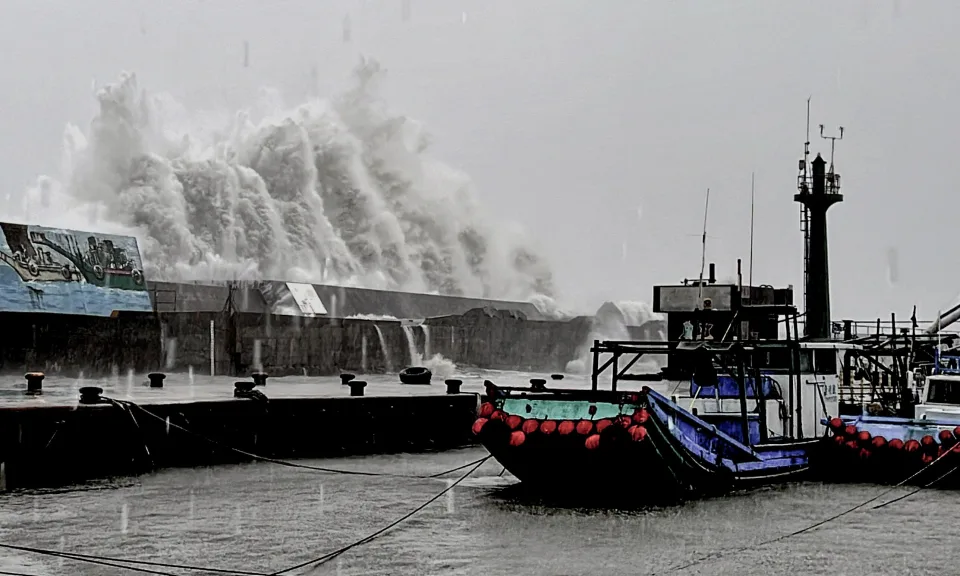
Typhoon Kong-Rey made landfall in Taiwan, bringing dangerous winds and severe weather conditions. As the storm tracks toward mainland China, it has led to significant disruptions, including stock market suspensions, flight cancellations, and power outages. With forecasts predicting heavy rainfall in Shanghai, Typhoon Kong-Rey poses risks of flooding and landslides, highlighting the increasing intensity of severe weather events in the region.
Overview of Typhoon Kong-Rey
Typhoon Kong-Rey made landfall in Taiwan on Thursday, packing dangerous winds and heavy rainfall, and has set the stage for significant weather disruptions across the region. With maximum sustained winds recorded at 51 meters per second (approximately 114 miles per hour), Kong-Rey is classified as a Category 3 hurricane, causing widespread concern among residents and officials alike.
Impact on Taiwan
As the typhoon crossed the east coast of Taiwan, authorities suspended trading on the island’s $2.5 trillion stock market due to the adverse weather conditions. This suspension marks the third such occurrence in 2024, underscoring the storm’s severity. The impact of Kong-Rey has been felt across various sectors, leading to flight cancellations, power outages, and the shuttering of schools and offices.
Taiwan’s Central Emergency Operations Center reported that 27 people have sustained injuries due to the storm, and approximately 8,600 residents have been evacuated as a precaution. Moreover, over 96,000 households are currently without power, according to data from state-owned Taipower.
Precautionary Measures Taken
In response to the approaching typhoon, many businesses and institutions have activated their emergency protocols. Taiwan Semiconductor Manufacturing Co. (TSMC), a key player in the global technology supply chain, implemented routine typhoon alert preparations at its manufacturing plants. Several companies issued exchange filings to announce delays in board and shareholder meetings, as well as the distribution of cash dividends.
Rail services across the island have also been suspended, and as of 2 p.m. local time, 229 domestic and 314 international flights had been canceled. The rapid mobilization of resources indicates the seriousness with which the government and businesses are treating this natural disaster.
History of Typhoons in Taiwan
Kong-Rey is noted as a particularly large storm, with strong to typhoon-force winds extending up to 660 kilometers from its center. This breadth makes it significantly larger than Hurricane Helene, which struck Florida earlier this year. The last typhoon of comparable strength to make a direct hit on Taiwan so late in the year was Gilda in November 1967.
In 2007, another typhoon named Krosa clipped Taiwan’s northeastern coast before heading toward mainland China. Historical data suggests that such intense storms can lead to severe flooding and landslides, particularly in Taiwan’s mountainous regions.
Forecast for Shanghai and Beyond
After making landfall in Taiwan, Typhoon Kong-Rey is expected to weaken slightly as it moves northwest across the island before re-emerging in the Taiwan Strait. From there, the storm could veer toward the southeastern Chinese province of Fujian as it curves into the East China Sea.
Shanghai is bracing for what could be its heaviest rainfall event in November in nearly four decades. Forecasts suggest that parts of the city may receive up to 280 millimeters of rain overnight into Friday. This deluge poses significant risks, including potential flooding, which could disrupt transportation and lead to property damage.
Conclusion
Typhoon Kong-Rey serves as a stark reminder of the increasing intensity of severe weather events globally. As Taiwan copes with the immediate aftermath, and Shanghai prepares for significant rainfall, it is crucial for residents to stay informed and heed warnings from local authorities. The impact of this typhoon underscores the need for continued vigilance in the face of changing climate patterns and the resulting natural disasters.